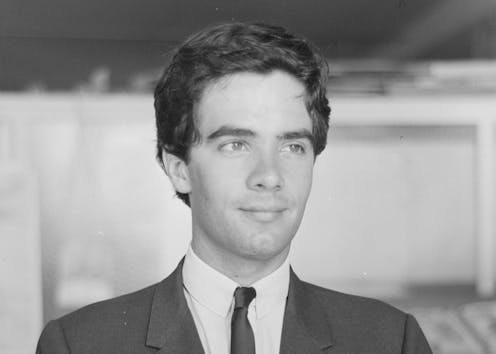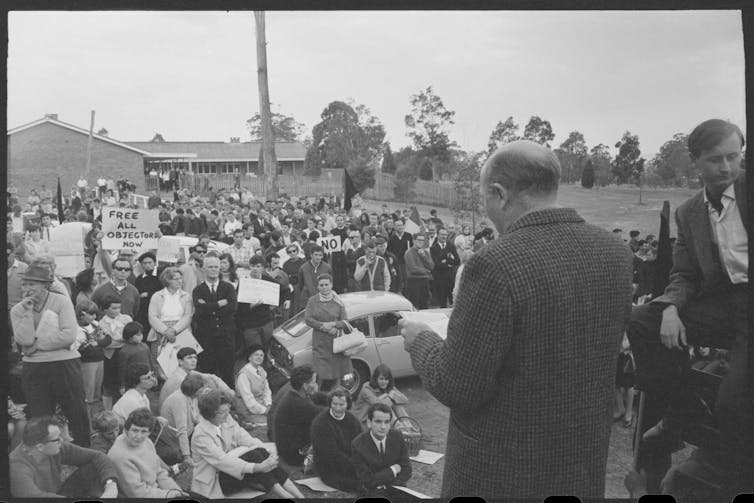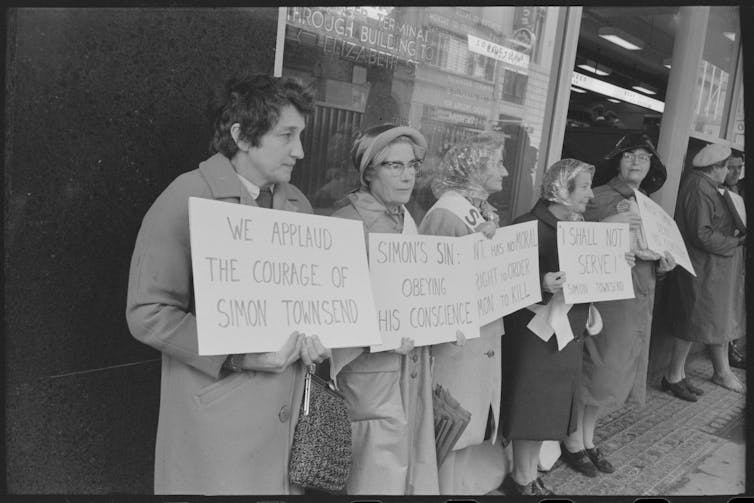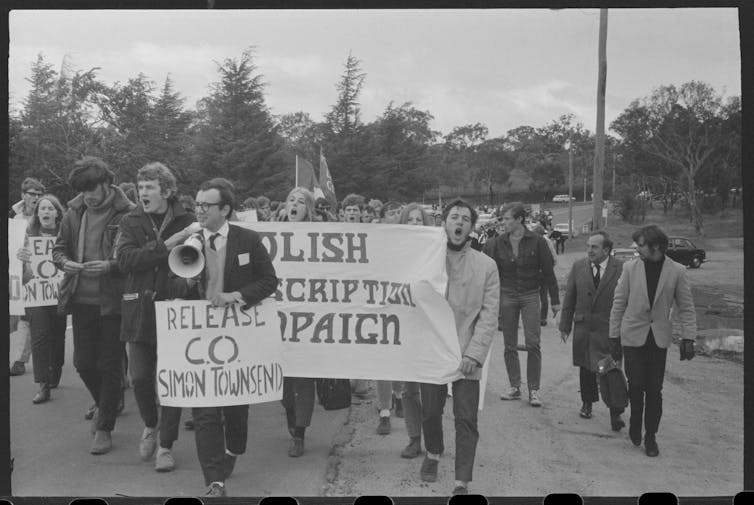Source: The Conversation (Au and NZ) – By Effie Karageorgos, Senior Lecturer in History, University of Newcastle

Journalist Simon Townsend has died aged 79 only a few months after being diagnosed with an aggressive form of cancer. A statement released by his family reported “In his final days, Simon was surrounded by his family and a mix of journalists, writers, actors, political activists and Italians”.
Townsend is best remembered for hosting the Logie-winning children’s show Wonder World from 1979 until 1987.
But it is equally important to focus on his time as a political activist and conscientious objector during the Vietnam War. When Townsend was a fledgling journalist in his early 20s, he fought fearlessly against the draft and was imprisoned twice for his pacifist beliefs.
Conscientious objection
On November 24 1964, Liberal prime minister Robert Menzies re-introduced conscription through the National Service Act. It became mandatory for men turning 20 to register for national service.
Of the more than 800,000 who registered, 64,000 eventually served.
Approximately 14,000 refused to register for a variety of reasons. Refusal was a crime punishable by up to two years in prison, unless an exemption was granted on the grounds of conscientious objection, generally connected to religious belief.
Others registered, but claimed conscientious objection before they attended their standard military medical examination. Townsend registered as required by law in 1965 and immediately attempted to claim conscientious objector status on the grounds of pacifism.

Mitchell Library, State Library of New South Wales and Courtesy SEARCH Foundation, CC BY
This was refused by a judge in 1966 who said he was “not sincere”. The judge ordered Townsend to attend his medical examination. Townsend refused. He was sent to serve a one month prison sentence at Sydney’s Long Bay Gaol in early 1967.
On his release, Townsend again applied for an exemption. Again, he was unsuccessful. In February 1968, he refused to attend his next medical. In March, Townsend disobeyed an order to report for military duty. He was charged in the Special Federal Court in Sydney on May 15 and imprisoned again.
The Abolish Conscription Campaign
Four days later, Townsend wrote a letter to the Sydney protest group Abolish Conscription Campaign, reporting eight prison guards constantly watched over him and woke him up every two hours for his “wellbeing”.
He said he was “pretty miserable”, but his brother had sought help from Labor politicians Gough Whitlam and Len Devine, who paid Townsend a visit in support.

Mitchell Library, State Library of New South Wales and Courtesy SEARCH Foundation, CC BY
On June 10 1968 the Abolish Conscription Campaign organised a “major protest” to “demonstrate for the release of all conscientious objectors and the abolition of conscription”. Activists marched from Liverpool Station to Ingleburn Military Camp, where Townsend was being held ahead of his June 14 court date.
On this date, Townsend’s application for conscientious objector status was accepted – the court no doubt influenced by the increasing public attention his case had attracted.
Townsend approached his legal difficulties with courage and generosity. Between his two stints in prison, he formed Sydney’s Conscientious Objectors’ Group. Townsend, along with fellow activists including Quakers, feminists and pacifists, used their time and energy providing information to conscientious objectors facing court.
‘The Unconscriptables’
After Townsend’s release, he continued to fight against the National Service Act.
In August 1968 he joined the Caravan Against Conscription, which saw Sydney activists travel through rural New South Wales to spread the anti-war message.
In the next month Townsend helped to form a group called The Unconscriptables, “open to all those young men who face civil gaol because of a responsible and conscientious decision not to comply with the National Service Act”.
Townsend later supported Unconscriptable Geoff Mullen when he unsuccessfully stood for the federal seat of Wentworth in the October 1969 election. In an act of resistance, Mullen was running against Liberal minister for labour and national service, Leslie Bury.
Selfless action
During my State Library of New South Wales Fellowship research into quiet protest during the Vietnam War, I came across a court summons addressed to teacher, activist and former NSW Teachers Federation President Samuel Phineas Lewis, signed by Simon Townsend.
I became fascinated not only by Townsend’s personal story, but also his willingness to selflessly act on behalf of other young men impelled to fight in a war they did not believe in.
This court summons represents one of many protest actions performed by Townsend as Secretary of the Committee in Defiance of the National Service Act, formed in July 1969.

Mitchell Library, State Library of New South Wales and Courtesy SEARCH Foundation, CC BY
At their first meeting in Sydney Town Hall, Townsend, along with Committee leader Ken Thomas (an activist and businessman who, in 1946, established KW Thomas Transport, later known as Thomas Nationwide Transport or TNT), and 70 others including barristers, academics, unionists, housewives and clergymen, publicly signed a Statement of Defiance proclaiming their ongoing support for men who evaded conscription.
In encouraging others to break the law, they intentionally contravened the Crimes Act in the hope the time taken to prosecute them in court would delay any legal action towards young conscientious objectors.
Eventually 8,000 Australians made Statements of Defiance, were reported by Committee members to authorities and were fined or summonsed to appear in court. The Liberal Government soon became wise to the Committee’s scheme and ceased reacting.
These relatively quiet protest acts were hugely impactful and incredibly brave.
Townsend continued to fight against the National Service Act until Prime Minister Gough Whitlam abolished conscription as his first order of business following his December 2 1972 election win. This was while working as a reporter for This Day Tonight, a position he held from 1970 until the launch of Wonder World.
The loss of Simon Townsend is deeply felt in this country, not only for his journalism but also for his fearless activism. Vale.
![]()
Effie Karageorgos received funding from the State Library of New South Wales for this research.
– ref. Remembering Simon Townsend as a conscientious objector and fearless anti-Vietnam War activist – https://theconversation.com/remembering-simon-townsend-as-a-conscientious-objector-and-fearless-anti-vietnam-war-activist-247457




